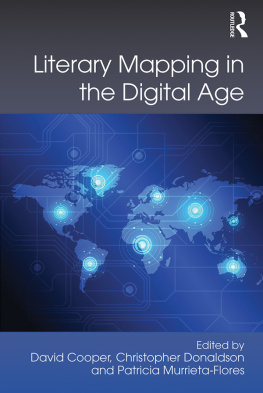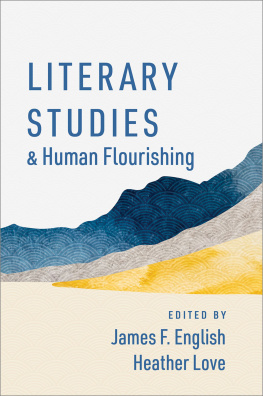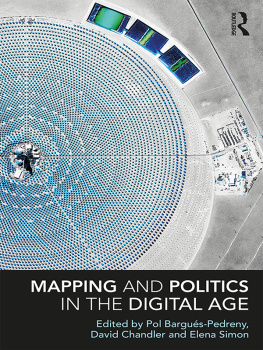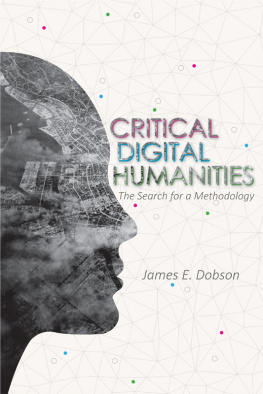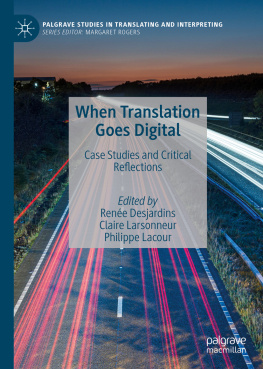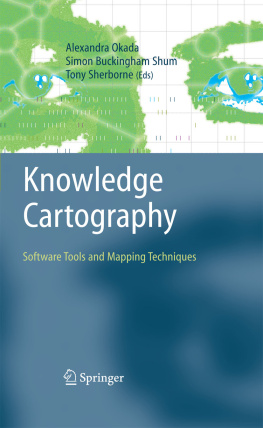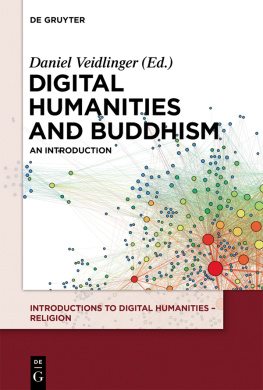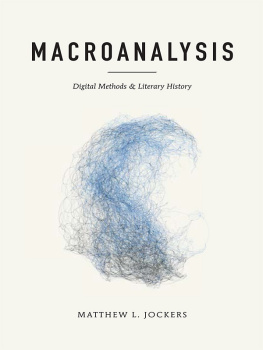Literary Mapping in the Digital Age
Drawing on the expertise of leading researchers from around the globe, this pioneering collection of essays explores how geospatial technologies are revolutionizing the discipline of literary studies. The book offers the first intensive examination of digital literary cartography, a field whose recent and rapid development has yet to be coherently analysed. This collection not only provides an authoritative account of the current state of the field, but also informs a new generation of digital humanities scholars about the critical and creative potentials of digital literary mapping. The book showcases the work of exemplary literary mapping projects and provides the reader with an overview of the tools, techniques and methods those projects employ.
David Cooper is Senior Lecturer in English Literature at Manchester Metropolitan University, UK.
Christopher Donaldson is Lecturer in Romanticism at the University of Birmingham, UK.
Patricia Murrieta-Flores is Director of the Digital Humanities Research Centre at the University of Chester, UK.
Digital Research in the Arts and Humanities
Series Editors: Marilyn Deegan, Lorna Hughes, Andrew Prescott and Harold Short
Digital technologies are becoming increasingly important to arts and humanities research, expanding the horizons of research methods in all aspects of data capture, investigation, analysis, modelling, presentation and dissemination. This important series will cover a wide range of disciplines with each volume focusing on a particular area, identifying the ways in which technology impacts on specific subjects. The aim is to provide an authoritative reflection of the state of the art in the application of computing and technology. The series will be critical reading for experts in digital humanities and technology issues, and it will also be of wide interest to all scholars working in humanities and arts research.
Also in the series:
Critical Gaming: Interactive History and Virtual Heritage
Erik Champion
Performing Digital: Multiple Perspectives on a Living Archive
David Carlin and Laurene Vaughan
Crowdsourcing our Cultural Heritage
Mia Ridge
Digital Archetypes: Adaptations of Early Temple Architecture in South and Southeast Asia
Sambit Datta and David Beynon
Paradata and Transparency in Virtual Heritage
Anna Bentkowska-Kafel, Hugh Denard and Drew Baker
Art Practice in a Digital Culture
Hazel Gardiner and Charlie Gere
Literary Mapping in the Digital Age
Edited by David Cooper, Christopher Donaldson and Patricia Murrieta-Flores
Forthcoming:
Digital Palaeography
Stewart Brookes, Malte Rehbein and Peter A. Stokes
Shakespeares Language in Digital Media
Jennifer Roberts-Smith and Janelle Jenstad with Mark Kaethler
Historic Newspapers in the Digital Age
Paul Gooding
Literary Mapping in the Digital Age
Edited by
David Cooper, Christopher Donaldson
and Patricia Murrieta-Flores

First published 2016
by Routledge
2 Park Square, Milton Park, Abingdon, Oxon OX14 4RN
and by Routledge
711 Third Avenue, New York, NY 10017
Routledge is an imprint of the Taylor & Francis Group, an informa business
2016 selection and editorial matter, David Cooper, Christopher Donaldson and Patricia Murrieta-Flores; individual chapters, the contributors
The right of David Cooper, Christopher Donaldson and Patricia Murrieta-Flores to be identified as the authors of the editorial material, and of the authors for their individual chapters, has been asserted in accordance with sections 77 and 78 of the Copyright, Designs and Patents Act 1988.
All rights reserved. No part of this book may be reprinted or reproduced or utilised in any form or by any electronic, mechanical, or other means, now known or hereafter invented, including photocopying and recording, or in any information storage or retrieval system, without permission in writing from the publishers.
Trademark notice: Product or corporate names may be trademarks or registered trademarks, and are used only for identification and explanation without intent to infringe.
British Library Cataloguing in Publication Data
A catalogue record for this book is available from the British Library
Library of Congress Cataloging-in-Publication Data
A catalogue record for this book is available from the Library of Congress
ISBN: 9781472441300 (hbk)
ISBN: 9781315592596 (ebk)
Typeset in Baskerville
by Apex CoVantage, LLC
Contents
DAVID COOPER, CHRISTOPHER DONALDSON AND PATRICIA MURRIETA-FLORES
Part I
Mapping Methods: Systems, Approaches and Innovations
RYAN HEUSER, MARK ALGEE-HEWITT, ANNALISE LOCKHART, ERIK STEINER AND VAN TRAN
MIRANDA ANDERSON AND JAMES LOXLEY
IAN GREGORY AND CHRISTOPHER DONALDSON
BARBARA PIATTI
CHARLES TRAVIS
Part II
Mapping Practices: Places, Writers and Readers
SALLY BUSHELL
ANGHARAD SAUNDERS
JON ANDERSON
LES ROBERTS
Part III
Mapping Futures: Collecting, Curating and Creating
DAVID J. BODENHAMER
TREVOR M. HARRIS, H. FRANK LAFONE AND DAN BONENBERGER
GARY PRIESTNALL
TANIA ROSSETTO
DAVID COOPER
Mark Algee-Hewitt is Assistant Professor of Digital Humanities in the department of English at Stanford University, USA, and Co-Associate Director for Research of the Stanford Literary Lab.
Jon Anderson is a Reader in Human Geography at Cardiff University, UK.
Miranda Anderson was the initiator of and a Research Fellow on the Palimpsest Project. She also initiated and is now a Research Fellow on the AHRC-funded project, A History of Distributed Cognition at the University of Edinburgh.
David J. Bodenhamer is Executive Director of the Polis Center, Professor of History, and Adjunct Professor of Informatics, and Co-Director of the Virtual Center for Spatial Humanities at Indiana UniversityPurdue University, Indianapolis, USA.
Dan Bonenberger is Associate Professor of Geography at Eastern Michigan University, USA.
Sally Bushell is Professor of Romantic and Victorian Literature at Lancaster University, UK.
David Cooper is Senior Lecturer in English Literature at Manchester Metropolitan University, UK, and an associate of the European Research Council-funded Spatial Humanities: Texts, GIS, Places project.
Christopher Donaldson is Lecturer in Romanticism at the University of Birmingham, UK; he is also Co-Investigator on the Leverhulme Trust-funded Geospatial Innovation in the Digital Humanities project (20152018) and an associate of the European Research Council-funded Spatial Humanities: Texts, GIS, Places project (20122016).
Ian Gregory is Professor of Digital Humanities in the Department of History at Lancaster University, UK, and Principal Investigator on both the European Research Council-funded Spatial Humanities: Texts, GIS, Places project (20122016) and the Leverhulme Trust-funded Geospatial Innovation in the Digital Humanities project (20152018).
Trevor M. Harris is Eberly Distinguished Professor of Geography at West Virginia University, USA.

